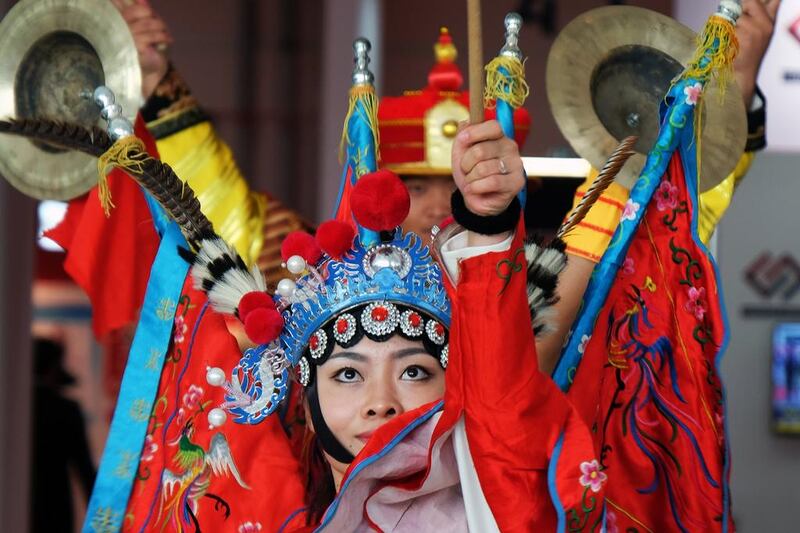As China seeks to create global behemoths and focuses on developing its services sector, its economic and trade relationship with the UAE is also changing – from looking at the Emirates simply as an end market for goods to being a hub for finance and technology investments.
China is becoming a global investor, with eyes on improving the might of its companies and their global reach via an investment and acquisition spree.
Its corporates have bought foreign brands ranging from Swedish car maker Volvo to holiday company Club Med.
China is also funnelling its investments in the UAE into new sectors such as information and communication technology.
For example, Alibaba Cloud set up the UAE YVOLV, a cloud computing joint venture with UAE conglomerate Meraas, as the Chinese tech company spreads its tentacles into the Arabian Gulf.
“Whereas the UAE principally used to be a trading hub for low-cost consumer goods [from China], a large number of entrepreneurs have since moved out into the service sector,” says Ben Simpfendorfer, the managing director and founder of the Hong Kong-based consultancy Silk Road Associates.
In the past five years, all four major state-owned Chinese banks have set up operations in the UAE, mainly in the Dubai International Financial Centre, and some have listed bonds on Nasdaq Dubai. Even the government of Hong Kong has listed its US$1 billion Islamic bond or sukuk on Nasdaq Dubai.
Such developments are a far cry from 1984, the year when diplomatic ties were established between the UAE and China and bilateral trade volumes ranged at about $100 million.
China is now the UAE’s No 2 trade partner after India, despite the bilateral trade volume declining last year by 11.5 per cent, to $48.5bn from $54.8bn in 2014.
The lower trade volume – the result of wobbly global growth and the lower oil price – has not deterred Chinese investors from coming to the UAE.
Chinese non-financial foreign direct investment into the UAE rose by 352 per cent in the first nine months of this year to $390m compared with a year earlier, according to He Song, the commercial counsellor at the Chinese embassy in Abu Dhabi.
The attraction of the UAE is related to its hub status and well-developed hard and soft infrastructure, he says. “The UAE has a very strong position in expanding their business in this region, even into Africa and even into mid-Asian countries.”
Dubai’s hosting of Expo 2020 will also drive growth in both the services and trade sectors as mega projects get announced.
“If we look into the long term, the investments will lead the trade volume to a new level,” says Mr He. “Before 2020, there will be more Chinese companies and joint ventures between our countries.”
Currently, there are more than 4,000 Chinese companies and trade agencies registered with the ministry of economy.
Business ties with China are expected to grow after Sheikh Mohammed bin Zayed, Crown Prince of Abu Dhabi and Deputy Supreme Commander of the Armed Forces, made a three-day visit to the country in December last year, which led to a number of agreements. During that trip, Abu Dhabi investment company Mubadala Development said it would launch a joint fund worth $10bn with two Chinese state institutions.
Mubadala has also signed an initial agreement with HNA Group, a Chinese company that focuses on tourism, logistics and financial services, to explore increased investment cooperation.
The agreement grew out of Mubadala’s sale earlier this year of a majority stake in SR Technics, a maintenance, repair and overhaul company for the civil aviation sector, to HNA.
“UAE authorities consider partnership with China extremely important in developing renewable energy technologies, cooperation in space and communication technologies,” says Alp Eke, the senior economist for Mena at the National Bank of Abu Dhabi.
China’s growing interest in exporting its technology to the UAE and not just products is evident.
David Wang, the managing director at MIE Events and the organisers of China Trade Week in Abu Dhabi, which started yesterday, wants to invite technology companies to the exhibit, which is now dominated by retail companies. The number of exhibitors this year has grown by 40 per cent to around 300 companies.
“We should bring technology from China. We need to present solutions not just presenting the parts,” says Mr Wang. “Sustainable energy is a new sector that is important and it is compliant with Abu Dhabi’s new strategy.”
China’s interest in the UAE is also connected with its role as an intermediary between the East and West. As Chinese companies invest in markets such as Pakistan, they will increasingly rely on neighbouring countries to help them execute these deals.
“Chinese companies are following the path of other multinationals before them and looking to build out generally global businesses, rather than just ship products out of China,” says Mr Simpfendorfer. “They actually have to build a local footprint in neighbouring markets, and that provides a new opportunity for UAE professional services to intermediate.”
The UAE could also play a vital role in China’s One Belt One Raod (Obor) initiative, that aims to link Asia, Europe and Africa to boost economic development along the way by mimicking the ancient Silk Road trade route.
“More and more Chinese companies are participating in the infrastructure projects in Obor countries, which has created numerous opportunities for financial support and equipment output,” says Mohamed Salama, the head of banking at Standard Chartered Bank in the UAE.
“At Standard Chartered, we are seeing an increased awareness of Chinese investors around the Middle East and given that there’s a surplus of capital seeking to get a return, coming into the Middle East is something they [Chinese investors] are increasingly comfortable doing.”
dalsaadi@thenational.ae
Follow The National's Business section on Twitter





